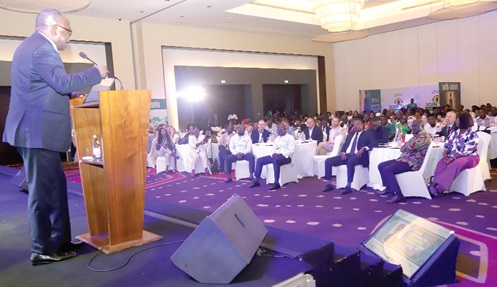Stakeholders in the textile sector have called for investment in recycling infrastructure to turn waste clothing into a resource for sustainable development.
Making the call in separate statements at the opening of a major global summit and fashion, dubbed “Landfills to Landmarks 2025”, they said such an investment would not only help to curb the environmental consequences associated with the indiscriminate dumping of used clothes, but also contribute significantly to job creation.
Again, they said investment in textile recycling would make markets such as Kantamanto in Accra and Kejetia in Kumasi major hubs of textiles trade on the continent.
Those who made the call included the Minister of State, Climate Change and Sustainability, Issifu Seidu; a programmes officer at the Environmental Protection Authority (EPA), Juliana Bempeh; the founder and Executive Director of Kokrobito Institute, Renee C Neblett, and an executive of the Ghana Used Clothing Dealers Association (GUCDA), Marvin Owusu.
The global summit, with representation of clothing designers from Europe and North America, is dedicated to tackling the growing issue of textile waste and advancing the circular economy.
The two-day forum, which began in Accra yesterday, is being attended by global leaders, industry stakeholders and sustainability experts exploring solutions for the fashion industry's environmental challenges.
Context
In Ghana, second-hand clothes have become a staple of the local fashion economy, with Kantamanto in Accra noted as the preferred destination for used clothing, as it receives about 15 million pieces of clothing waste per week.
In 2023, the country imported over $93 million worth of used garments, mainly from the US, the UK and China, according to UN Comtrade.
It is estimated that 100,000 tonnes of second-hand clothing are imported annually, with 40 per cent of it going straight to informal waste disposal sites.
Collaboration
Mr Seidu said it was in recognition of the crucial need to coordinate activities and help address the triggers of climate change across the various sectors that the President, John Mahama, created a Ministry of Climate Change and Sustainability.
He said the issues with used clothing and its environmental impact would feature prominently in climate change interventions by the government, especially in the quest to transition into the circular economy.
"From my office, we will make sure to collaborate with other relevant sector ministers to have climate change and sustainability desks to execute proposals for projects aimed at enhancing the circular economy and building climate-resilience," the minister said.
He said efforts were also being made to establish a climate change and sustainability hub in the country to provide climate solutions across sectors.
Challenges
Ms Bempeh said that although trade in used clothing provided a source of livelihood for many people, it had dire environmental challenges.
For instance, she said inadequate disposal space had led to unsightly conditions at collection and disposal sites.
Again, the officer said poor formal collection systems, characterised by non-sorting and limited recycling, had led to environmental pollution, including the emission of carbon dioxide and toxic pollutants from burning.
For his part, Mr Owusu said rather than seeing used clothing as waste, it was important for players in that sector to be supported to conduct their trade in ways that did not harm the environment.

